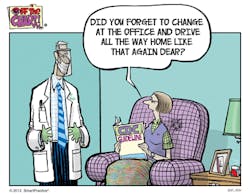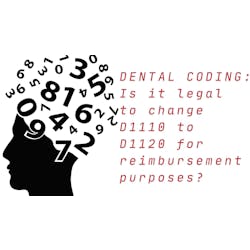Dear RDH:
I am responding to a letter from Dr. Michael P. Rethmann in your February issue of RDH. I agree with him completely. In dentistry, we are encouraged to use universal precautions to protect the patients and employees. We are also concerned with the patients' overall health. That is why we have health histories and review them at each visit.
We need to all use "universal precautions" when we discuss the relationship of dental health and systemic health (or health in general). We advise patients to give up tobacco. We advise them against oral piercings. We give them instructions on proper brushing, flossing, and other interdental options, and we recommend electric tooth brushes.
We advise our patients on the use of bisphosphonates (Fosamax, Boniva). Time magazine (Sept. 20, 2010) stated that there is a "100 percent increase in risk of esophageal cancer over five years in osteoporosis patients using bisphosphonates." We should all know by now the possible risk from oral doses of bisphosphonates (osteonecrosis of the jaw). This risk was identified and defined as a pathological entity in 2003.
However, this risk still remains uncertain with oral doses of bisphosphonates. Why should we not advise patients on a possible link to oral health and systemic health?
Evidence has been building for over 10 years that painless inflammation in the bloodstream is a major trigger of heart trouble, worse than high cholesterol. This inflammation weakens the walls of the blood vessels and can trigger heart attacks. Inflammation comes from many sources, including periodontal disease and lingering urinary infections. Any low grade infection, I would think, could cause inflammation in the bloodstream. The American Heart Association and the Centers for Disease Control and Prevention were the first to propose an important role for inflammation testing as a way of judging whether people need treatment to protect their hearts. The test checks for C-reactive protein, or CRP, a chemical necessary for fighting injury and infection. It is my understanding that the Medical University of South Carolina Dental School is researching a link between periodontal disease and colon cancer.
In our practice, we have two male patients who had ongoing periodontal and/or endodonic infection. Both were told to see a periodontist, and both were told of a possible perio-systemic link. The typical excuse of "it is not hurting" and "I am too busy" is what we heard from these patients for several years. Both ended up hospitalized with very high fevers, and both had heart valve replacement. One had to have emergency periodontal treatment in advance of the surgery, and the other had to have an oral surgeon extract two infected molars in his hospital room before surgery.
Maybe these patients had weak valves to start with; we do not know. Therefore, "universal precautions" should be taken to advise any patient with ongoing periodontal problems to remedy the problem! RDH
Giovanna Acanfora Becker, RDH
Charleston, South Carolina
Past RDH Issues







